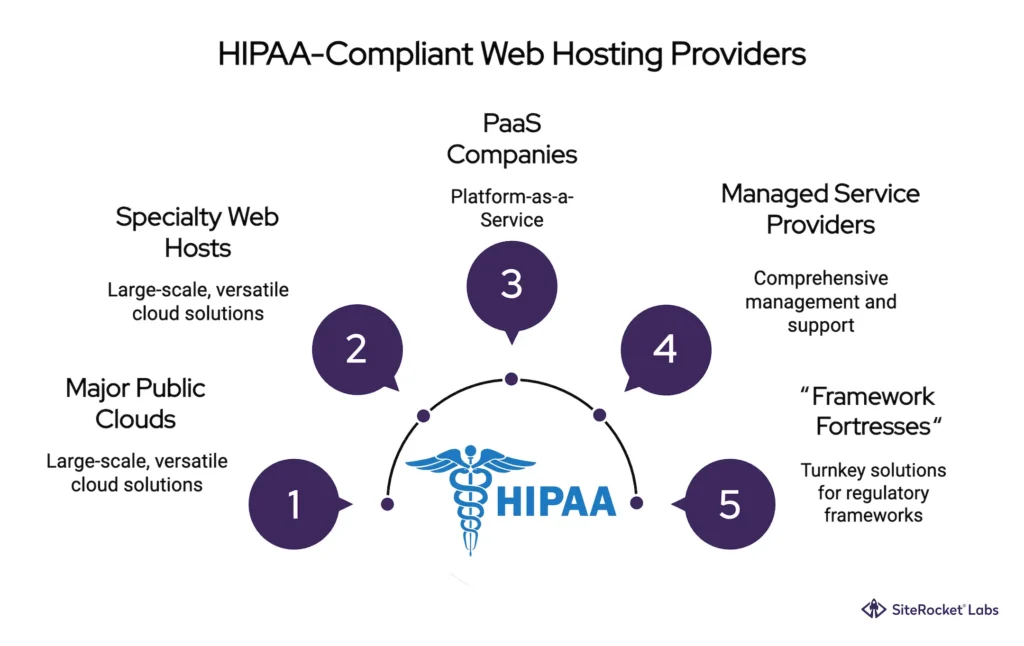Looking for HIPAA compliant hosting? We’ve worked with a number of HIPAA-compliant hosting providers over the years, and we’ve found that they vary widely in terms of their approaches and price points. Here’s a breakdown of the best options to help you make a well informed decision:
Your Options
There are many different types of HIPAA-compliant hosting providers in the market, but we find that it’s helpful to group them into five broad categories:

- Major public clouds
- Specialty web hosts
- PaaS (Platform as a Service) companies
- Managed service providers
- “Framework fortresses”
Curious what each one is and does? Read on to find out.
1. Major Public Clouds
Many companies host HIPAA-compliant applications on public cloud hosting providers like Amazon Web Services, Microsoft Azure or Google Cloud. All of these companies will sign a BAA (business associate agreement) with their clients, a key HIPAA requirement, and have extremely flexible and configurable hosting platforms. These companies are well known and already boast numerous certifications such as SOC2, making them a trusted choice for mission-critical application hosting.
Compliance isn’t automatic. You’ll need to configure everything yourself. This includes adding firewalls, ensuring that all your data is encrypted at rest, implementing audit logging, and configuring many other controls.
Most small companies lack the resources to do this work – and if they do, we often advise to use an additional compliance automation tool to ensure that you have configured them properly (we like Sprinto and Dash – but that’s a topic for another time).
Relevant links to HIPAA-compliance info by hosting provider:
2. Specialty Web Hosts
A number of smaller web hosts provide similar services as the public cloud providers, but with built-in protections like firewalls, siloed hosting environments, automated data backups, and other protections that are necessary for HIPAA.
The monthly subscription rates for the first two providers below are generally more expensive than hosting on public clouds, but since their services reduce your administrative overhead, they might actually end up being more cost effective than configuring all of the security yourself.
3. “Framework Fortresses”
This is our term for a turnkey hosting solution that enforces all of the technical safeguards from various regulatory frameworks – including HIPAA – out of the box, so you can focus on building your application:
Aptible – For Regulated Industries
Aptible is a platform-as-a-service (PaaS) designed specifically for companies handling sensitive data in regulated industries like healthcare and fintech.
Unlike general-purpose cloud providers, Aptible’s platform provides built-in features like automated audit logging, encryption at rest and in transit, intrusion detection, DDoS protection, vulnerability scans, isolated environments for each application, and other security safeguards that are required by HIPAA.
This simplifies the process of building, deploying, and managing applications in a way that meets HIPAA requirements. Additionally, Aptible provides comprehensive compliance documentation and supports security best practices out-of-the-box, allowing developers to focus on building their apps while remaining confident they’re meeting regulatory obligations.
This specialization makes Aptible uniquely suited for startups and enterprises navigating complex compliance landscapes.
TrueVault – Compliance & Data Privacy First
TrueVault offers a backend-as-a-service platform built specifically for compliance with HIPAA and other frameworks. Instead of managing infrastructure, developers interact with TrueVault via its API to securely store and process PHI.
It includes built-in encryption, access controls, audit logging, and BAA support. Unlike Aptible, which provides full app hosting, TrueVault primarily hosts the regulated parts of your data, such as PHI. It’s a strong fit for mobile apps or frontend-heavy tools that need a compliant backend without the overhead of managing servers.
MedStack – Digital Health Focused
MedStack is a HIPAA-compliant hosting provider that’s tailored specifically to digital health startups. It combines secure container hosting with built-in compliance tools – encryption, logging, vulnerability monitoring, and templated DevOps workflows – that are designed to speed up launch and reduce audit friction. While Aptible offers more flexibility for custom environments, MedStack focuses on fast, opinionated deployments that simplify the compliance path for lean teams. It’s ideal for early-stage companies prioritizing speed and simplicity.
4. Platform-as-a-Service (PaaS) Companies
These companies provide platforms where they manage all of the servers for you, and enable you to launch your application onto their platform without having to worry about configuring and maintaining any servers.
This often offers faster development, increased agility and reduced costs by freeing developers from having to manage servers. As with major public clouds, however, you will often need to do extra work to ensure that your application has the necessary safeguards in place.
Additionally, developing and deploying applications to PaaS platforms sometimes requires additional expertise, and PaaS applications can sometimes be more difficult to troubleshoot than conventional applications when things go wrong.
There are several PaaS providers in the market, and here are three strong options for HIPAA compliant application hosting:
Heroku Shield – Built for HIPAA Compliance
Heroku Shield is Heroku’s HIPAA-compliant offering. It uses a managed container model called “dynos” where applications run in smart containers, which are continually monitored, patched, and upgraded.
Vercel – Serverless Hosting
Vercel is a unique serverless hosting platform that was built for applications written in the Next.js programming framework but which is also available for other platforms. Its services are now HIPAA compliant.
AWS Amplify – Amazon’s PaaS Offering
AWS Amplify is Amazon Web Services’ PaaS offering, and can be used to host HIPAA compliant applications with the proper safeguards in place.
5. Managed Service Providers
If you want to stay out of the infrastructure business entirely, MSPs handle compliance, security, uptime, and performance on your behalf so you can focus on app development.. They serve as a “trusted server admin” and also have a platform that ensures that your application stays secure and operational at all times. While there are many managed service providers (MSPs) on the market, the best offerings for HIPAA-compliant hosting that we’ve used are:
Pros and Cons of Each Approach
Some providers give you full control but require deep technical expertise. Others remove the complexity but limit your flexibility. The right option depends on your product, your team, and how hands-on you want to be with infrastructure and compliance.
Here’s a comparison of our five categories of HIPAA hosting:
| Hosting Option | Pros | Cons |
| Major Public Clouds |
|
|
| Specialty Web Hosts |
|
|
| “Framework Fortresses” |
|
|
| Platforms-as-a-Service |
|
|
Need Help?
Not sure which HIPAA-compliant hosting setup makes the most sense for your app?
I’m not here for a hard sell or to push a particular platform. I’m here to help you make a smart call that fits your technology stack and your team.
If you want to run your situation by someone who’s been through this with other health tech teams, feel free to reach out and I would be happy to chat!
